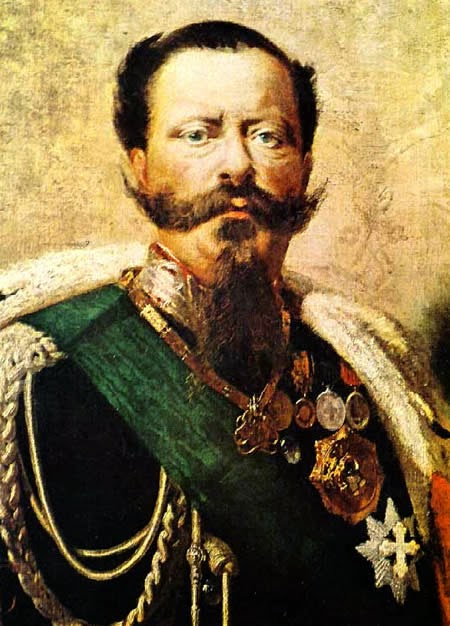 |
| Victor Emmanuel II |
Victor Emmanuel II was born on March 14, 1830, in Turin, the eldest son of Charles Albert, king of Piedmont-Sardinia, and Maria Theresa of Habsburg-Lorraine. During the first Italian War of Independence (1848–49), Victor Emmanuel fought alongside his father, seeing action at Pastrengo, Santa Lucia, Goto, and Custoza where, on July 24–25, 1848, the Sardinian forces were driven from Lombardy.
On March 23, 1849, Charles Albert was forced to abdicate the throne after being defeated at the Battle of Novara on March 23—he went into exile in Portugal and died four months later—and Victor Emmanuel became king.
He managed to negotiate a peace agreement with the Austrians on August 9, 1849, but the Piedmont Chamber of Deputies refused to ratify it. Victor Emmanuel responded by sacking the prime minister, Claudio Gabriele de Launay, and replacing him with Massimo D’Azeglio. New elections were held, and the new chamber ratified the treaty.
  |
In 1852 Victor Emmanuel appointed Count Camillo di Cavour as prime minister, and together they were to be involved in the Italian Risorgimento—the reunification of Italy—along with Mazzini and Garibaldi. To achieve this, Cavour persuaded the king that there should be an alliance with the British and the French, and the opportunity arose with the outbreak of the Crimean War. Piedmont sent over a small contingent.
Then Victor Emmanuel reached an agreement with the French emperor Napoleon III at Plombières in 1858, where Piedmont and France would take part in an attack on Austria and the former would get the Kingdom of Lombardy-Venetia and the French would be given Nice and Savoy.
However, the fighting began badly for the French, with France getting Nice and Savoy, but Piedmont only gaining Lombardy. Cavour resigned, but Victor Emmanuel was able to get Naples and Sicily, in plebiscites, to vote to join Sardinia-Piedmont, and on February 18, 1861, the Kingdom of Italy was established.
In 1866 Venice was added to Italy, and in 1871 the Papal States were annexed, with Rome as the capital. The taking of Rome was only possible with the French being involved in the Franco-Prussian War. It also led to Victor Emmanuel being excommunicated. This was reversed in 1878, just before Victor Emmanuel’s death on January 9, 1878. He was succeeded by his son, Umberto, who reigned until 1900.